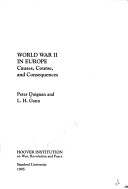Fifty years after its conclusion, the ordinary newspaper reader has difficulty remembering that Hitler, for a time, ruled over most of the European continent. After the fall of France in 1940, only Britain and its empire held out. It was only in 1941 that the conflict became global, as both the Soviet Union and the United States were successively drawn into the maelstrom. The Wehrmacht proved formidable. But in the end, Nazi tyranny collapsed. By contrast, the Western democracies--widely stereotyped by their opponents as decaden--magnificently passed the test of war, and the United States turned into the "arsenal of democracy."
The war had many unintended side effects. The power of the state grew in every belligerent country. In Central Europe there was genocide, and there were vast population shifts. The United States ceased to be isolationist. The United States also provided a new economic role model to Western Europeans and helped to reconstruct Western Europe through the Marshall Plan and other devices. The United States helped defend Western Europe militarily through NATO. Democracy was rebuilt in Germany and Italy, thereby defying right-wing forecasts that fascism was the wave of the future. The United States profoundly influenced at the same time Western Europe's new consumer culture, economic management, and popular entertainment.
The war also accelerated Western decolonization in the Third World and thereby occasioned a worlwide power shift. Victory, for a time, also legitimized the Soviet system in the eyes of its citizens; victory expanded Soviet rule over East-Central Europe. World War II thereby engendered the cold war, which the Soviet Union would ultimately lose.
- ISBN10 0817937528
- ISBN13 9780817937522
- Publish Date 1 September 1995
- Publish Status Transferred
- Publish Country US
- Imprint Hoover Institution Press,U.S.
- Format Paperback
- Pages 57
- Language English
